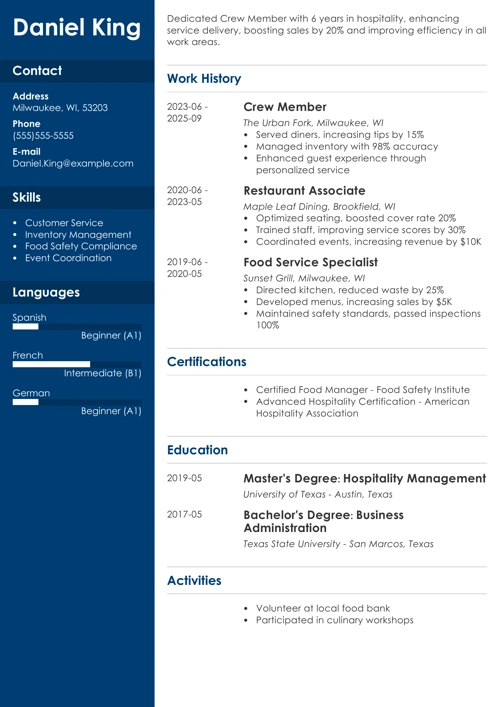Regret is one of the most tangible intangibles on Earth. Concocted deep inside the recesses of your brain, among choices, memories, and personal roadmaps, it can sit in the pit of your stomach with the weight of a thousand stones. This unique breed of dejection can be brought on by a wide range of life experiences: Some people regret not being there for family members during their time of need, while others wish they had spoken out against an injustice unfolding around them.
Then, there’s work.
We spend just about one-third of our lives at work, so it should come as no surprise that feelings of regret and self-doubt surrounding our careers can frequently bubble up. From staying at a dead-end job too long to shirking social responsibilities in favor of work, our jobs are fertile grounds for sowing the seeds of regret. That said, some lucky folks actually do enjoy their time spent on the clock, and we wanted to hear from them too.
We surveyed over 1,000 people to put career regrets – and job satisfaction – under the microscope. We picked their brains about common regrets, taking risks, the value of money versus happiness, and the differences between male and female respondents’ experiences. Ready? Let’s jump in.
Career Regret is Common
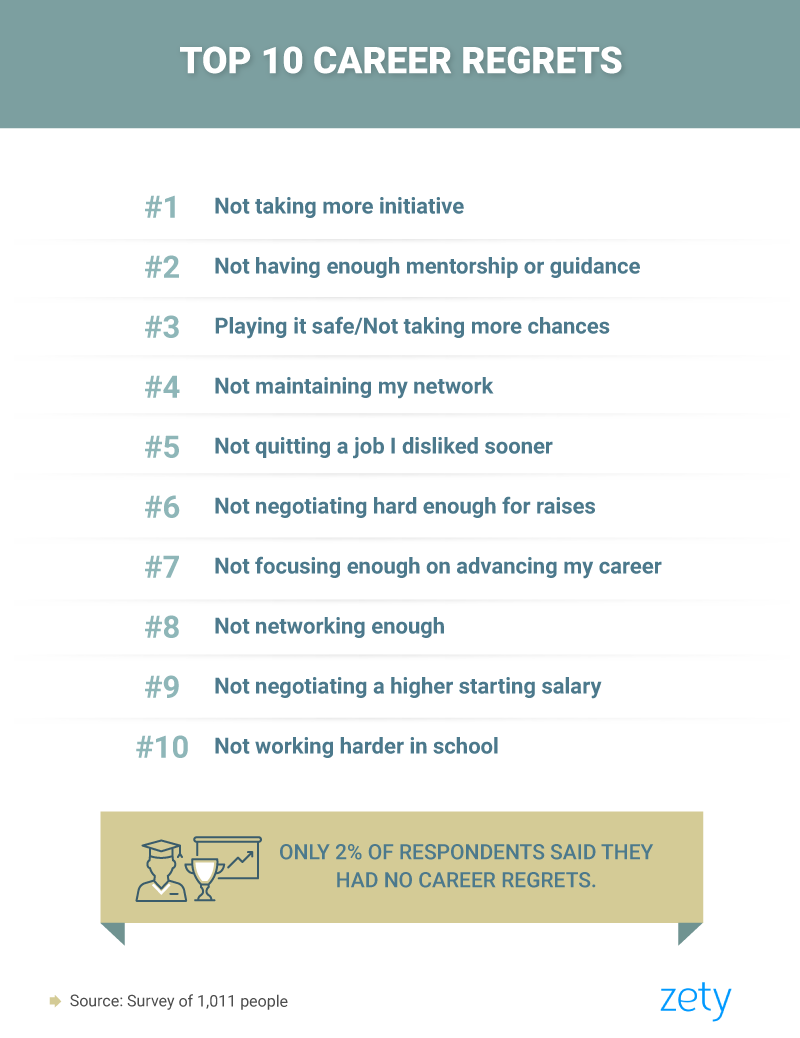
There’s a lot of chatter these days about attaining job-loving nirvana. But is the concept really just pie in the sky? Our respondents painted a slightly less rosy picture of employed life, with just 2 percent reporting they had no career regrets.
Not taking more initiative was the most regret-inducing action among our respondents. When you get into the swing of things at work, it’s easy to become complacent and occasionally rest on your laurels.
A lack of mentorship or guidance, not taking more chances, and de-prioritizing their personal lives were the next most common regrets among participants. On the topic of mentorship, research has revealed these programs are just as beneficial for employees as they are for the company: Mentoring initiatives are great at increasing retention rates, therefore saving companies big bucks by reducing employee turnover.
Many people also said they regretted stewing in a less-than-ideal job and not leaving sooner. So what would it take for someone to actually go through with quitting? Think strained relationships with the boss, under-stimulating work, a lack of recognition, and subpar corporate culture.
Gender Differences in Career Regrets
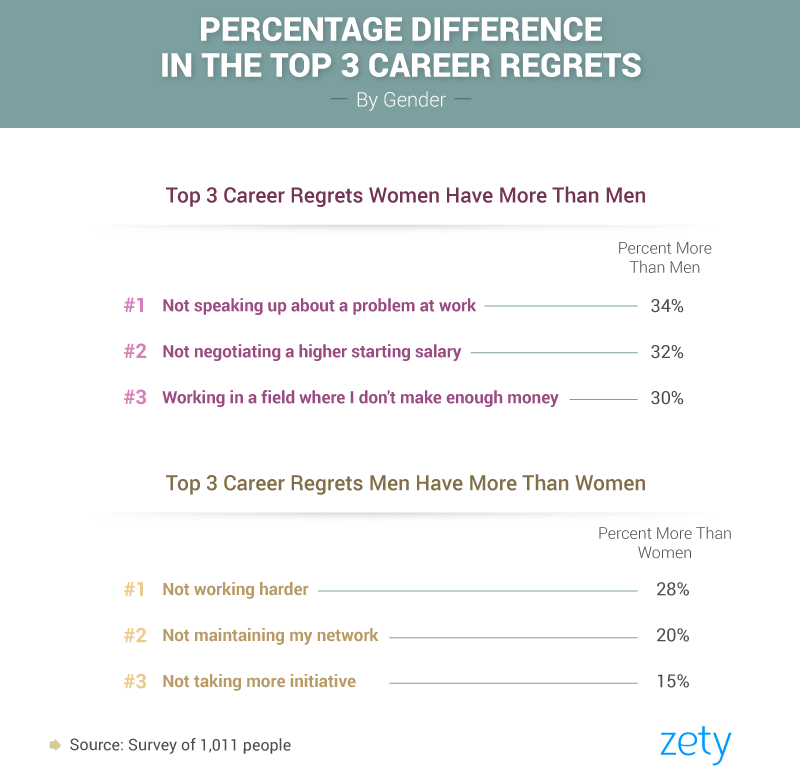
Regret is deeply personal, and according to our survey, there was a fairly significant divide between the types of regret experienced by women and men in the workplace.
Female respondents most frequently lamented not speaking up about a problem at work, at a rate of 34 percent more than men. In the #MeToo era, the topic of women finding their voice has come up time and time again, and women feeling unheard and outright ignored in the workplace is just one of the many concerns raised. Having learned that men who speak up at work can quickly climb the leadership ladder while women who do the same are brushed off, it’s no surprise that female respondents self-censored at such a high rate.
On the flip side, the greatest regret afflicting male respondents was not having worked harder at their job: Men experienced this sentiment 28 percent more than women. In a similar vein, they also regretted not putting in more hours at work, even though the pressure to work long hours can have very destructive effects on health and well-being.
The three runner-up regrets for women dealt with money: not negotiating a higher starting salary, choosing a field that didn’t pay very well, and not being aggressive enough during raise negotiations.
Risk It for the Biscuit
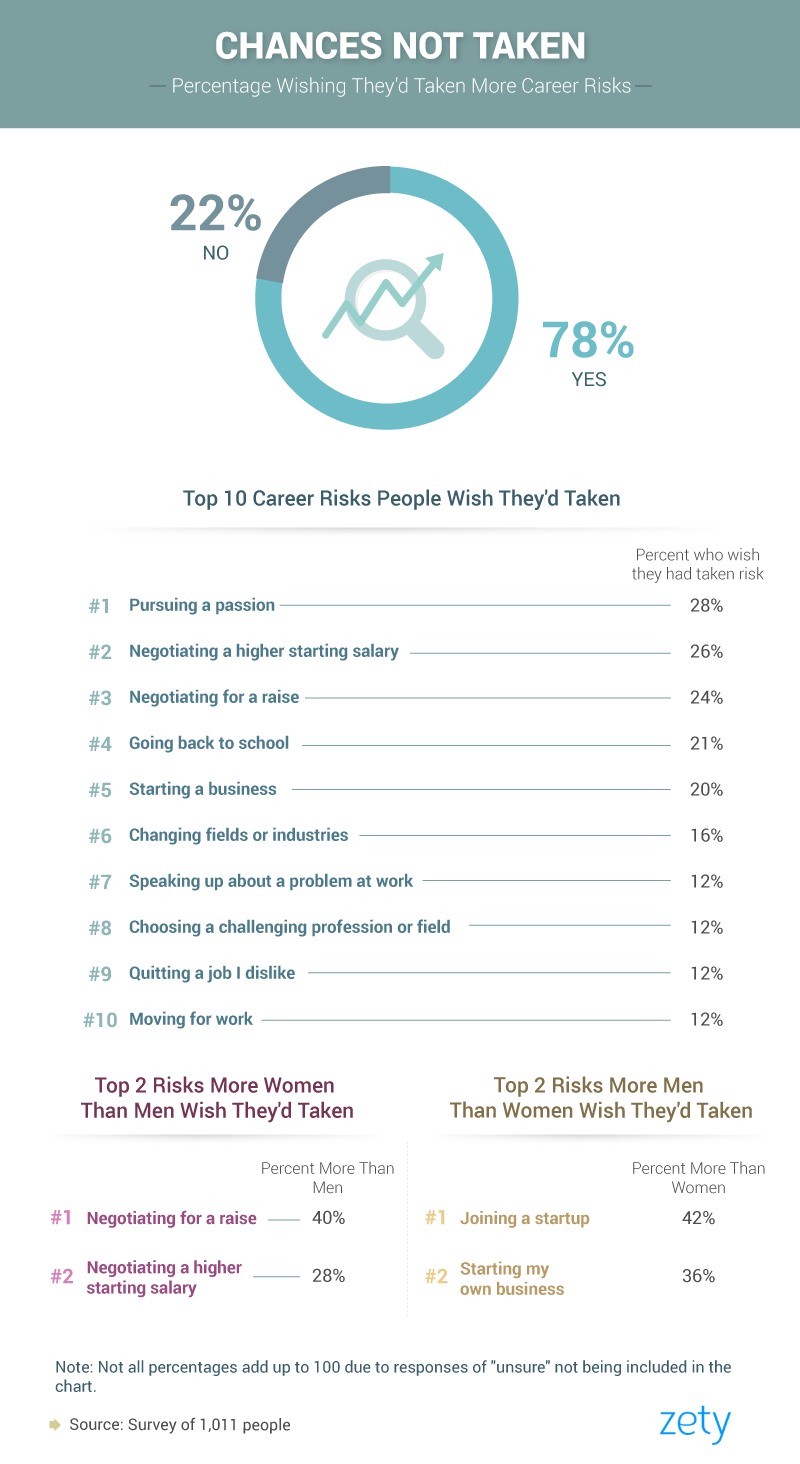
Taking calculated risks is an important part of life and can spell success when done properly. It’s no wonder then that 78 percent of respondents wished they had taken more career risks.
The most prominent regret – which afflicted 28 percent of our surveyed population – was not pursuing a passion. Another 26 percent lamented not having negotiated a more competitive salary, and 24 percent wished they had landed themselves a better raise. Before you fall into the same financial trap, make sure to brush up on your workplace negotiation skills so you can land the paycheck and subsequent raises you deserve.
When it came to taking risks, female respondents reported similar regrets about compensation, but at a much higher rate than men: Negotiating a raise was far and away the most prevalent risk women wished they had taken, at a rate of 40 percent more than men. Negotiating a higher starting salary took a distant second, followed by going back to school.
Men, on the other hand, wished they had joined a startup 42 percent more often than women. Jumping from corporate culture to the startup world takes some elbow grease, but some say the juice is well worth the squeeze. In a similar entrepreneurial vein, men also regretted not starting their own business, as well as not moving away to pursue a work opportunity.
Those Who Took the Plunge
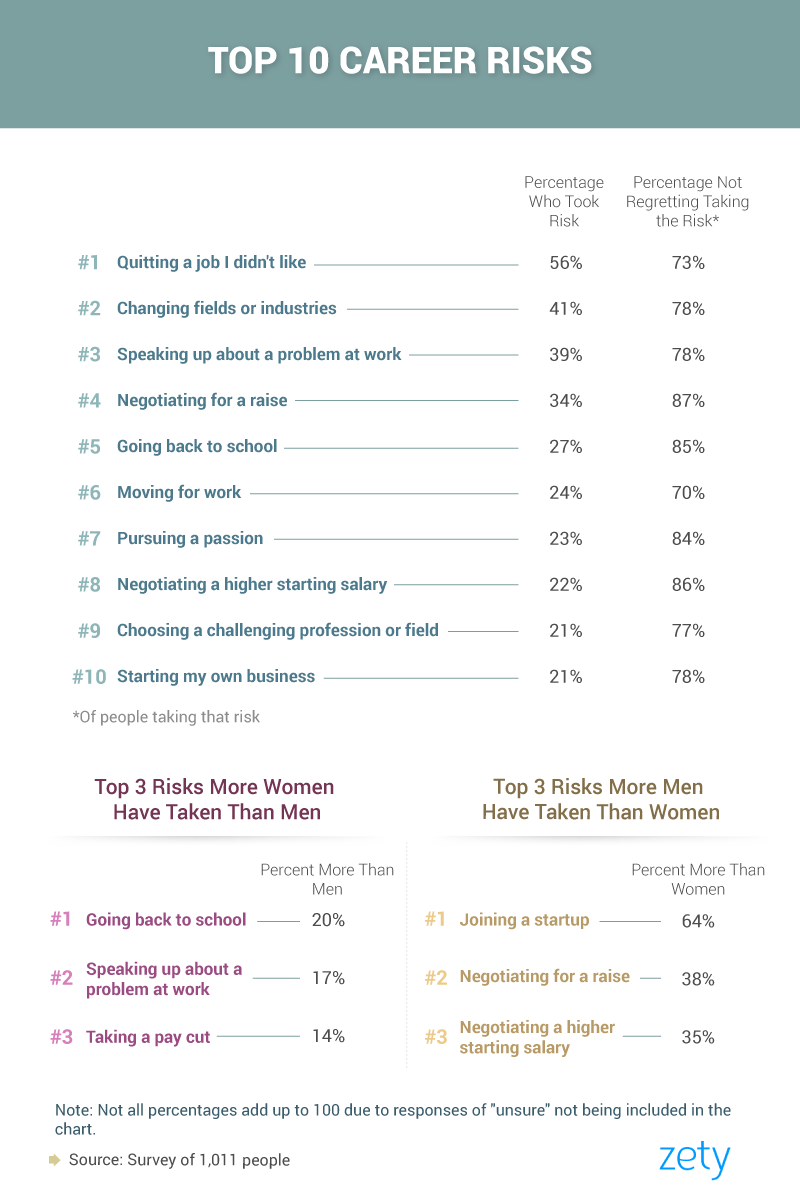
What’s the opposite of regret? Taking the bull by the horns and diving headfirst into risky waters! They’re murky, they’re choppy, but if you ask our respondents, they can turn your life around for the better.
The most common risk people did end up taking was quitting a job they didn’t like at 56 percent. Employees jump the proverbial fence every day, and one study found Americans switch jobs four separate times in the first 10 years of their career. Another 41 percent of respondents took a leap of faith by changing career fields, and 39 percent spoke up about a problem at work.
The burning question that accompanied these risks, of course, is: How many people have dipped their toe into the unknown and wished they hadn’t? Luckily for the people in the above-mentioned categories, more than 70 percent of them didn’t regret a thing. Negotiating for a raise was the least regrettable decision of all, with 87 percent saying they were glad they did it.
Women took the risk of heading back to school 20 percent more often than men did – and while going back to school as a working professional may sound like too much to handle, there are many ways to promote your endeavor’s success. Meanwhile, male respondents displayed an extremely high appetite for startup-related risks compared to their female counterparts: A whopping 64 percent more male respondents took on the risk of joining a budding company.
Satisfaction by the Numbers
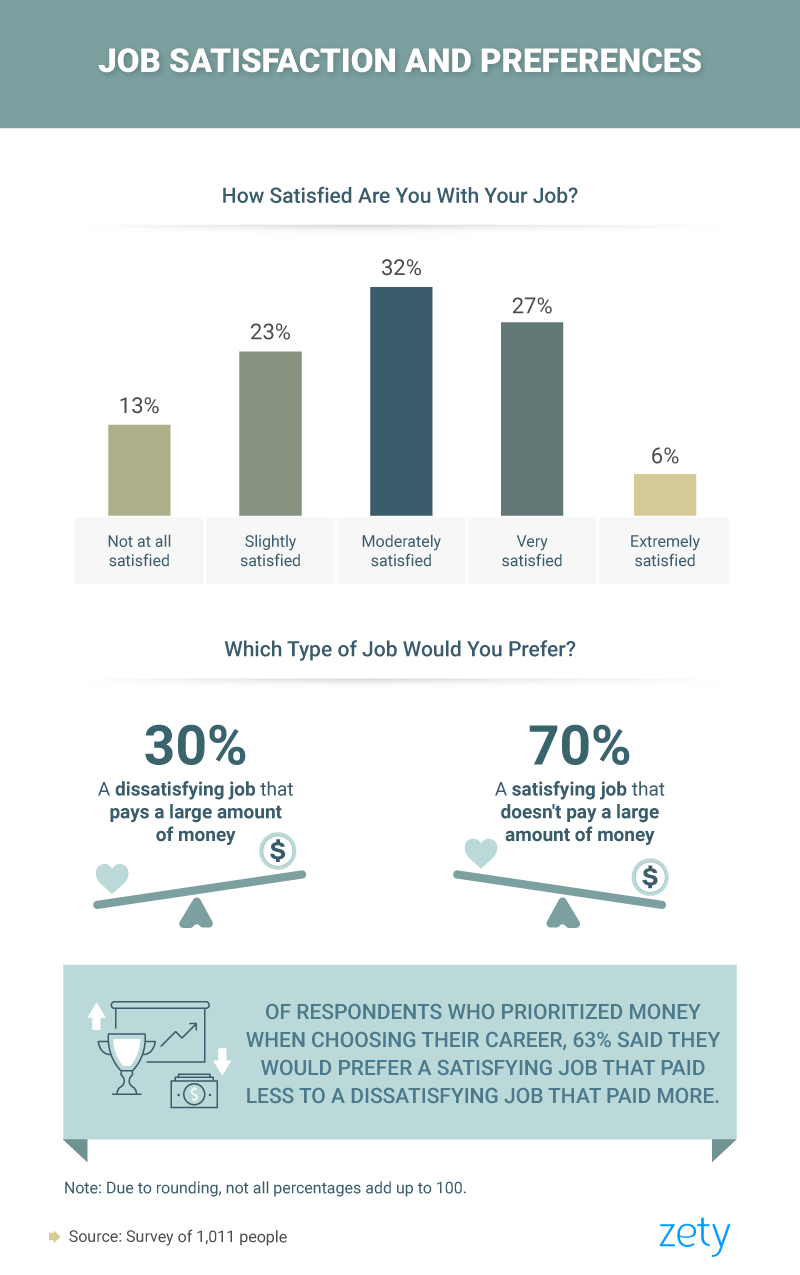
You might not feel it when your alarm goes off at 6 a.m. every day, but the U.S. seems to be experiencing a kind of job satisfaction heyday: The percentage of Americans who are satisfied with their careers has been steadily climbing year on year, finally surpassing more than 50 percent satisfaction in 2017. Job satisfaction hasn’t been this high since 2005.
When we asked respondents to rate their job-related happiness, the largest chunk of people gave us a middling response: 32 percent were moderately satisfied, followed by 27 percent who were very satisfied, and 23 percent who were slightly satisfied. Just 13 percent said they were not at all satisfied, but unfortunately, it was “extremely satisfied” that garnered the lowest volume of responses – just 6 percent.
The money-versus-happiness debate explores whether less-than-satisfied folks would opt for a higher workplace happiness quotient if it meant they made less money. And what did our respondents say? Yes, absolutely. Seventy percent said they would rather have a satisfying job that doesn’t pay a handsome sum, while just 30 percent would prefer a large amount of money tied to a dissatisfying role.
For the Love of Money?
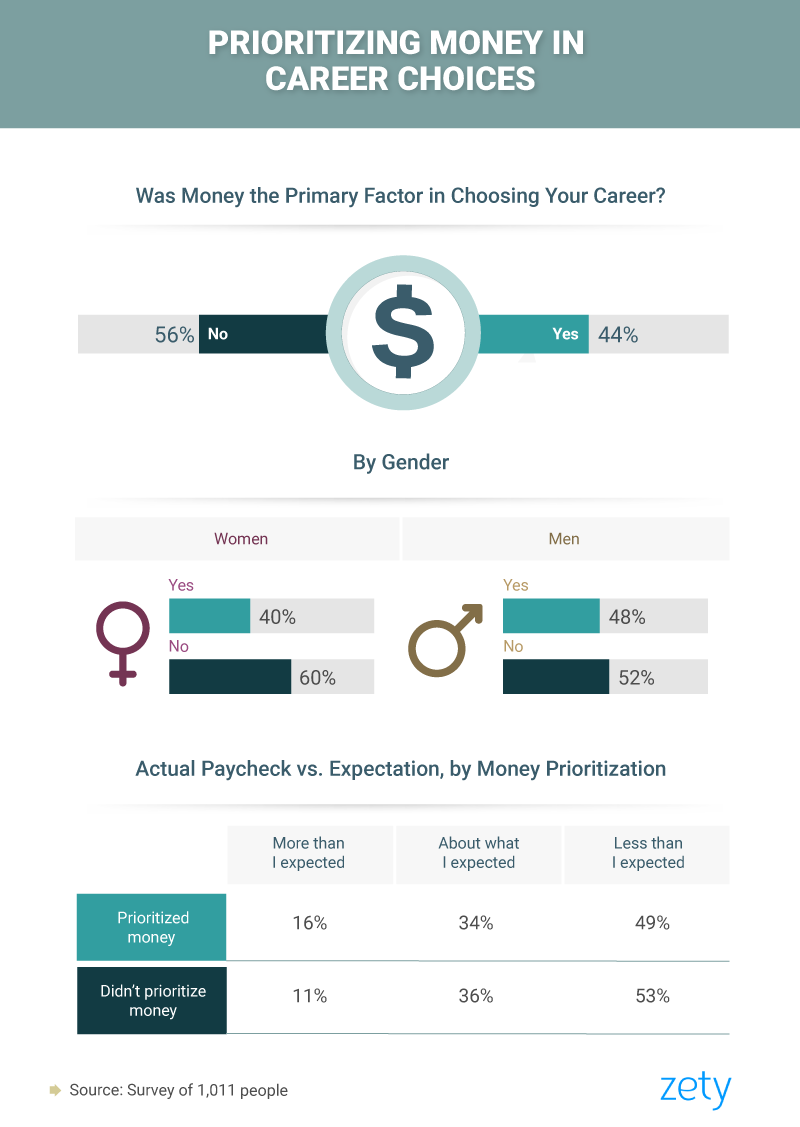
Building on the role that compensation plays in job satisfaction, we wanted to explore how people viewed money as a factor in choosing their career. If you ask business magnate Michael Bloomberg, the most important thing to look for in a job is the potential for growth and learning new things – but what did our respondents think?
The results were relatively balanced, but a slight majority of people (56 percent) reported they did not prioritize their salary when applying for a particular job. The other 44 percent did indeed make money a priority during their job hunt. And when the data were sliced by gender, men were more likely to focus on the dollars and cents than women.
While money doesn’t buy happiness, being paid fairly (and, if you’re lucky, generously) for your work is an important part of a fulfilling career – but don’t forget it’s just that, a part. Always consider the other tenets of your compensation package when weighing its value, including commissions, office location, company stability, and benefits like 401(k) matching.
Crossing your fingers for a sweet paycheck is one thing, but the reality is quite sobering for most of our respondents: Among those who prioritized money, just 16 percent were pleasantly surprised by their offer, compared to 49 percent who ended up earning less than they anticipated. Respondents who didn’t prioritize their salary returned slightly lower numbers, with just 11 percent exceeding their salary expectations and 53 percent earning less than they had hoped.
On the Pursuit of Happiness
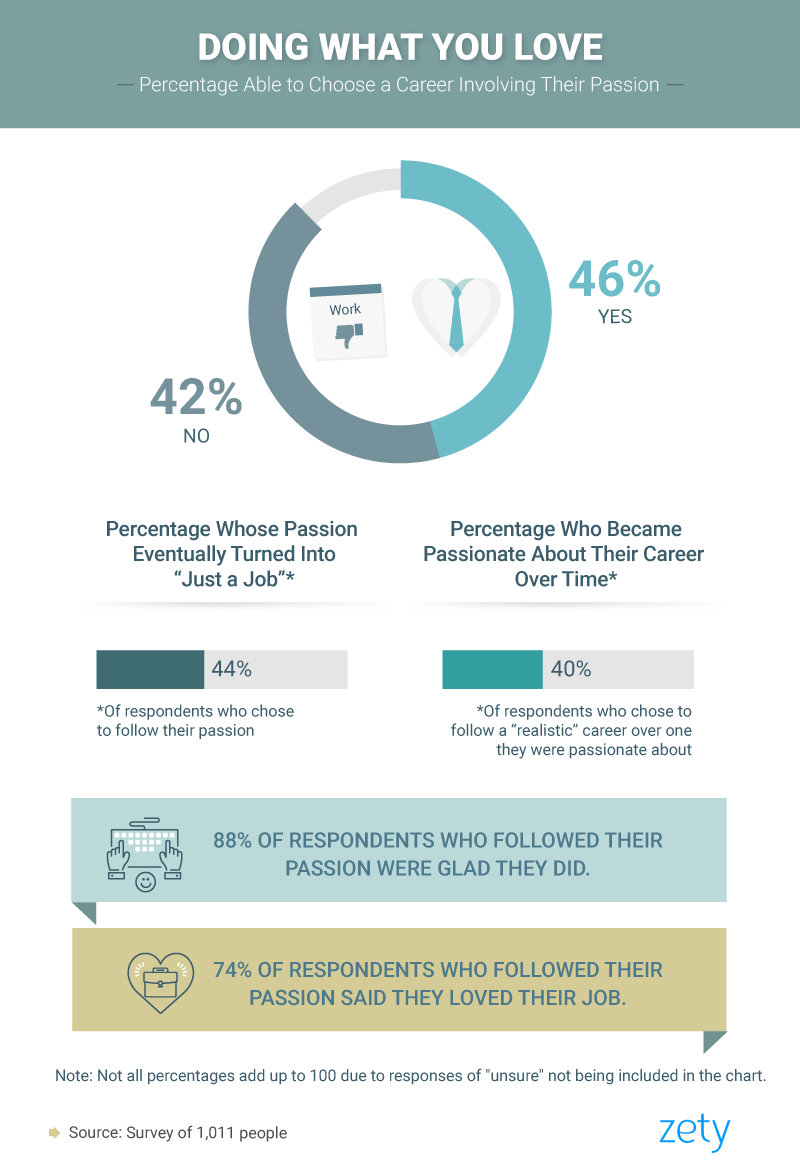
For some, “do what you love” will always be a pipe dream. For others, it’s something they’ve grown into over time. For our respondents, an impressive 46 percent were able to pursue a career they were passionate about. And while that may sound like a dream come true, there is indeed a dark side to working on your passion day in, day out: It becomes monotonous after a while.
Among those who chose to pursue a career they loved, 44 percent said their craft ended up turning into “just a job” after a certain amount of time. This descent into monotony may explain why – even though nearly half our surveyed population was able to enter the job market doing something they loved – a recent survey by Deloitte found that just 13 percent of the American workforce is passionate about their jobs.
On the sunny side of things, another 40 percent of workers who chose a more “realistic” career path over their true passion actually ended up loving their jobs over time. If that sounds crazy to you, think again: By employing a few simple tips, it’s entirely possible to reframe the way you view your career.
That Ship Has (Not) Sailed
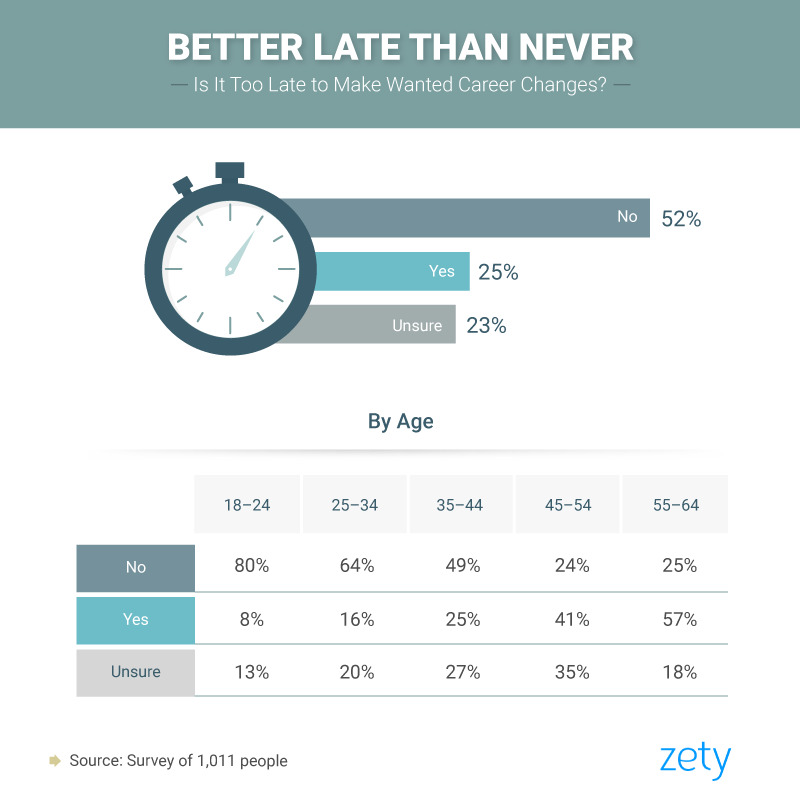
The eternal optimists of our world posit that it’s never too late to change careers, and the majority of our surveyed population agreed. Just over half of respondents (52 percent) felt a glimmer of job-related hope, expressing the window of opportunity was still open for them to make the career changes they so deeply desired. Another 25 percent said their ship had sailed, while 23 percent simply weren’t sure.
Our survey revealed that the flame of positivity burned brightest among young respondents and slowly dimmed with each older age bracket. Eighty percent of respondents aged 18 to 24 believed it wasn’t too late for them to pursue their dreams, while just 8 percent were naysayers. Millennials in particular are notorious for bettering their lot career-wise: One recent poll noted that 21 percent of millennials had switched jobs within the past year.
By the time 35- to 44-year-olds weighed in, only 49 percent felt they were cleared to make a career change, while 25 percent said it was too late. Just about a quarter of respondents from the two oldest demographics (45 to 54 and 55 to 64) felt a change was still realistic for them.
Conclusion
A career can be a winding road, and no two journeys look the same. However, one common thread that united nearly all of our respondents – to the tune of 98 percent – was regret. From not taking more initiative to not having enough guidance in the workplace, job-related regret was something that afflicted nearly every person surveyed. While women more frequently lamented a lack of speaking up, whether generally or in terms of reaching for a higher salary, men said they regretted not working harder or putting in more hours.
Regret is born in the absence of risk-taking, and over one-third of our surveyed population reported they wished they had taken more risks in their career. The most common missed opportunity was pursuing one’s passion, and among the leaps of faith people did indeed choose to take, quitting a disliked job was by far the most common. Only slightly more than a quarter of these risk-takers ended up regretting their decision.
When it came to money, the majority of our respondents were a good bit less interested in an aggressive salary over a fulfilling career. Salary was not the main driver behind the bulk of their career choices, and the majority would not swap a shinier paycheck for a less-fulfilling job.
The silver lining to all of this? Over half of respondents felt it was not too late for them to make the career changes they’ve been dreaming of. While the under-25 crowd felt the strongest about their potential, each demographic had a glimmer of hope in their hearts to some degree.
What about you? Every career pursuit begins with a stellar resume, so why not trust Zety when it’s time to create a compelling, eye-catching resume? Complete with a matching cover letter creator, Zety.com has all the templates, tips, and tools you need to land the job you really want.
Methodology
We surveyed 1,011 respondents via Amazon’s Mechanical Turk platform. Only respondents who have been in the workforce for more than three years were included, and all respondents included in the study passed an attention-check question. A comprehensive list of career regrets was created through several steps of research, crowdsourcing, and surveying. For the final survey that was presented to all 1,011 respondents, we selected the 30 most common career regrets identified in that earlier research.
Limitations
The data we are presenting rely on self-reports from respondents. Each person who took our survey read and responded to each question without any researcher administration or interference. There are many potential issues with self-reported data like selective memory, telescoping, attribution, or exaggeration.
Some questions and responses have been rephrased or condensed for clarity and ease of understanding for readers. In some cases, the percentages presented may not add up to 100 percent; depending on the case, this is either due to rounding or due to responses of “neither/uncertain/unknown” not being presented.
Sources
- Emma Freud, What is your biggest regret? Here are people's devastatingly honest answers
- One third of your life is spent at work | Gettysburg College
- Sujan Patel, 10 Things Most People Regret About Their Career: If you want to have a fulfilling career, don’t make these mistakes.
- David Sturt and Todd Nordstrom, 3 Reasons You Need To Either Learn To Love Your Job Or Lose It
- Doug Lawrence, How Does Mentoring Impact Employee Retention?
- TIME: Person of the Year 2017 - The Silence Breakers
- Reed Alexander, Women who speak out at work get ignored. Men become leaders
- Elizabeth J. McClean et al., The Social Consequences of Voice: An Examination of Voice Type and Gender on Status and Subsequent Leader Emergence
- Peter Fleming, Do you work more than 39 hours a week? Your job could be killing you
- Sam McRoberts, Here’s What Science Says You Should Do to Achieve Greater Success
- How to Negotiate a Higher Salary at Work | Jobboom
- Quora, If You Truly Want The Best Career Path, You Should Be Working At Startups and Small Businesses
- Helen Barrett, Plan for five careers in a lifetime
- Gwen Moran, How To Go Back To School While Working Full-Time Without Losing Your Mind
- Jena McGregor, Job satisfaction is up, but still well below one-time highs
- Georgina Bloomfield, Which is the key to happiness: High salary or job satisfaction?
- Marguerite Ward, Billionaire Michael Bloomberg: When choosing a job, prioritize this over salary
- Quora, Salary Is Important, But Here Are 5 Other Things You Shouldn't Ignore As A Job Seeker
- Deloitte Study: Only 13 Percent of the US Workforce Is Passionate About Their Jobs | Deloitte
- Adam Poswolsky, How to Fall in Love With Your Job
- Liz Ryan, When Is It Too Late To Change Careers?
- Amy Adkins, Millennials: The Job-Hopping Generation
Fair Use Statement
Don’t miss the chance to share these data – you might regret it! If you think your audience will be interested in this information, you can share it for noncommercial reuse. All we ask in return is that you link back to this page so that your readers can view the full study.
About Us
With Zety, job seekers can build a CV in minutes, learn what to include in a cover letter, pick a professional cover letter template, and even type up a follow-up email to send after a job interview.
About Zety’s Editorial Process
This article has been reviewed by our editorial team to make sure it follows Zety's editorial guidelines. We’re committed to sharing our expertise and giving you trustworthy career advice tailored to your needs. High-quality content is what brings over 40 million readers to our site every year. But we don't stop there. Our team conducts original research to understand the job market better, and we pride ourselves on being quoted by top universities and prime media outlets from around the world.


